
Let's Talk
Menu
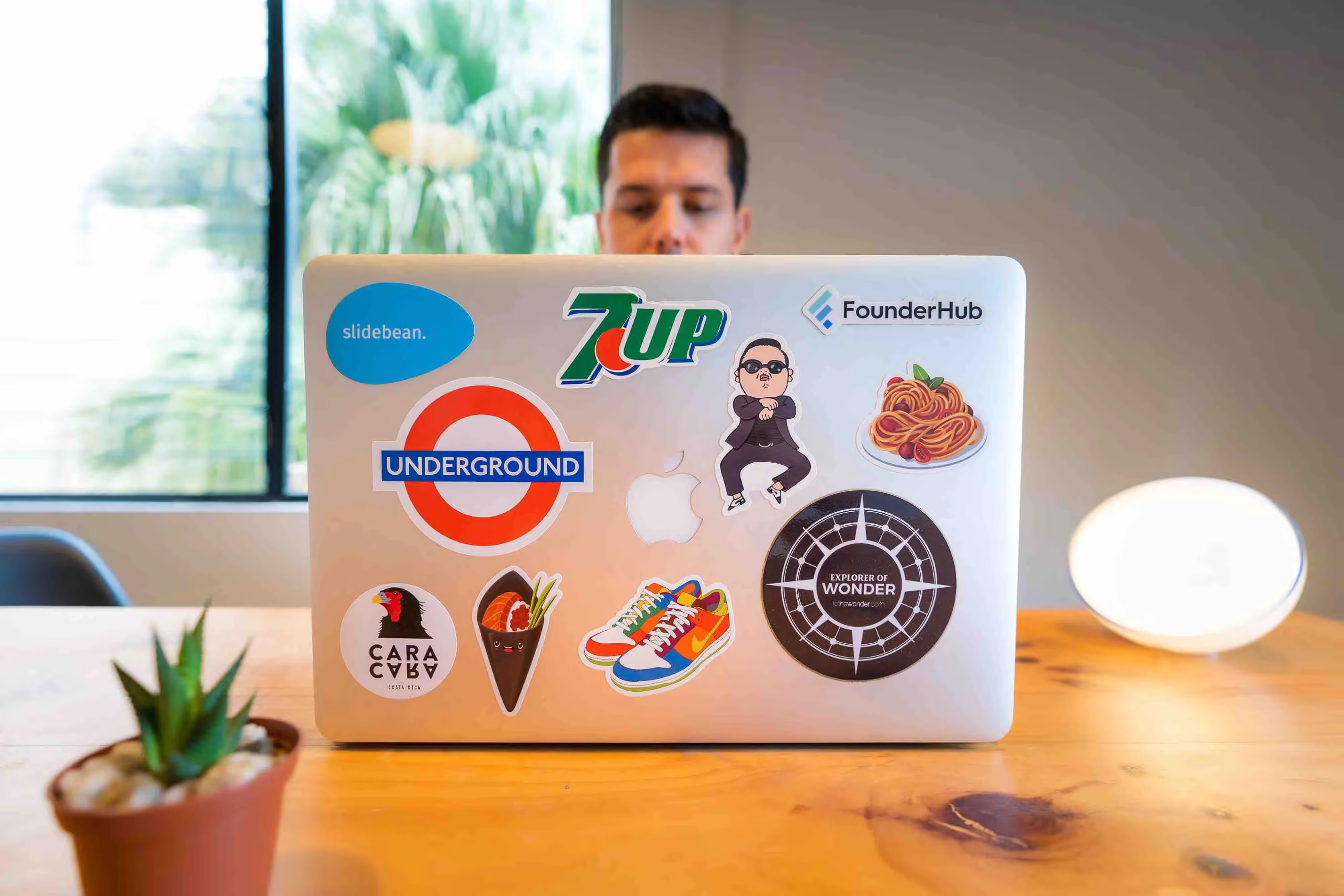
The popularity of podcasting has opened up new opportunities for businesses to tap into the power of audio storytelling. And because the best branded podcasts can captivate audiences, establish brand identity, and drive results, it’s definitely a concept worth working into your content strategy.
In this article, we'll explore the benefits of branded podcasts and a handful of actionable tips for creating your own. We’ve also picked out 13 of the best examples for your business to take inspiration from. So, whether you’re an entrepreneur looking to strengthen your brand’s presence, or you sit on the marketing team of a larger corporation, this guide will provide valuable insights to help you harness the potential of branded podcasts.
A branded podcast is a marketing initiative by a business that focuses on storytelling and engaging content, rather than just pushing products or services. A successful one will highlight brand messaging and overall ethos while providing value to the listener through entertainment, education, or information.
Branded podcasts can take various forms, too - from interview-style shows featuring industry experts, to narrative-driven series that explore a brand's history or impact on society. Others will lean more towards promotional content, and some will focus on providing value to listeners by addressing topics related to their industry or niche.
Planning and creating a successful branded podcast takes a lot of time, effort, and skill. But if you can get it right, there are multiple pay-offs that make it a worthwhile strategy.
Having a podcast content strategy is an opportunity to remind audiences of your company name, what it stands for, and what you’re selling or promoting. Including your logo in your podcast artwork, for example, will act as a subtle nod to your brand. As will a short and snappy brand pitch in your episodes’ intros and outros.
Small touches aside. Podcasts give you the opportunity to tell listeners about your brand’s story. Creating transparency about the origins of your business, and the values you stand for can be really beneficial when it comes to building a dedicated clientele. If clients genuinely feel like they know who you are as a brand, they’ll be more willing to work with you.
Connecting with audiences through audio or visual content pays dividends. Your voice is a powerful tool, and is capable of building up a more personal connection with listeners than written content is. And the more engaged your audience, the better. A branded podcast can also help to build trust and establish loyalty - particularly if you appear open and honest.
Because podcasts are so accessible, reaching a wider pool of potential customers is easy. The pure nature of podcasting means listeners can tune into shows from anywhere around the world, making them the perfect tool for reaching new audiences. Once an audio file has been uploaded and pushed live, there are few geographical limits on where it can be listened to.
Getting people to your brand’s website is the hardest part of the sales process. Thankfully, a good podcast content strategy will help you out with this. Because as your podcast builds, so will people’s confidence in it. And hopefully, so will your overall podcast SEO presence.
An in-depth explanation of podcast SEO is beyond the scope of this article. But if you’d like to learn more about it, check out the article below:
Podcast SEO: Tips to Optimise Your Episodes for Google Search
Perhaps one of the most obvious benefits to starting a branded podcast, but we’ll mention it anyway. Creating a podcast will hopefully lead to improved sales figures and conversions. If you can get your audience to trust you, you’re more likely to make a sale. And getting behind the microphone, putting a face to the name, and interacting with clients in a genuine way is key for building up that trust.
Once your podcast starts to gain some traction and popularity, there’s the potential to monetise it. If you can deliver engaging content on a regular basis to a loyal audience, you increase your chances of monetising episodes. This might be through sponsorships, cross-promotion, or affiliate marketing. Whatever it is, creating an additional stream of revenue is never a bad thing.
Podcasting is now one of the most accessible ways to become a thought leader.
In the past, you had to get on TV or publish a book to be considered a true thought leader. Meaning traditional media gatekeepers had all the power - they decided who was an expert, and who wasn’t. But things have changed. The internet and new media shifted the balance of power.
Creating a branded podcast can be a powerful strategy for establishing yourself as a leader in your field. By sharing relevant content, offering expert insights, and providing valuable information, a company can showcase its expertise and knowledge. And a well-produced, informative podcast featuring high-quality, expert guests can help you build credibility. Over time, this will help you position your brand as a reliable resource for customers, partners, and other stakeholders within the industry.
Now we've discussed the benefits of creating a branded podcast, let's explore some of the best ones out there.

#LIPSTORIES is a podcast by beauty retailer, Sephora, and highlights the personal stories of various inspiring women - discussing their journeys, challenges, and successes. The show then connects these stories to the emotions and memories of different lipsticks from the Sephora Collection.
This unique approach allows Sephora to showcase its products subtly and authentically, without overwhelming listeners with promotions. By focusing on powerful, relatable stories, #LIPSTORIES creates an emotional connection with its audience, leaving a lasting impression and building a strong association between the Sephora brand and empowering narratives.

The Message is a science-fiction podcast produced by energy provider, General Electric (GE). Episodes follow the journey of a group of cryptographers who attempt to decode a mysterious alien message. The podcast masterfully weaves in elements of GE's expertise in technology and innovation while maintaining a captivating, suspenseful storyline. This approach allows GE to showcase its brand values and areas of knowledge without resorting to direct promotions or sales tactics.
Life After is the sequel, and demonstrates how branded podcasts can leverage the power of storytelling to not only create memorable experiences, but also position the brand as an innovative leader in its field.

Shopify Masters is a corporate podcast produced by Shopify, explicitly catering to Shopify store owners and e-commerce enthusiasts. The podcast features interviews with successful entrepreneurs who share their experiences, insights, and advice on running and growing an online business.
By offering valuable information and real-life examples, Shopify Masters reinforces the platform's commitment to supporting its users and fostering a thriving e-commerce community. This approach helps position Shopify as an industry expert. It strengthens the connection between the brand and its audience, encouraging customer loyalty and promoting the platform as a valuable resource for e-commerce success.

Deep Dive is a sports-punditry podcast produced by ourselves in partnership with SailGP. The show gives die-hard sailing fans exclusive insight & access to the 2022/23 Global Sailing Grand Prix, and is hosted by two sailing legends, Stevie Morrison and David ‘Freddie’ Carr. Episodes are jam-packed with race predictions, on and off-water drama, driver interviews, performance reviews, result breakdowns, and more.
By providing a behind-the-scenes look into one of the sport’s biggest events, Deep Dive fosters a tight-knit community amongst its audience. Its energetic hosting style, professional production quality, and unique content carries appeal for all listeners - die-hard fan or not. This inarguably works to strengthen not just the SailGP brand in the sailing community, but also the sport’s presence to the entire industry.

2 Minutes of Zen is a branded podcast by Zendium, a dental care brand. The show is designed to provide listeners with quick and straightforward wellness hacks that can be practiced while brushing their teeth. Each episode presents a soothing, two-minute mindfulness exercise helping listeners to relax, unwind, and focus on their mental well-being during their daily dental care routine.
This innovative approach aligns with Zendium's brand values of promoting overall health and well-being, while ensuring their products remain top-of-mind. By connecting mental wellness with teeth brushing, 2 Minutes of Zen creates a unique, memorable experience that deepens the connection between the brand and its audience.

Why We Eat What We Eat, produced by Blue Apron, delves into the fascinating stories and cultural influences behind food, offering a unique perspective on our culinary choices and habits.
By exploring the history and science of food, Blue Apron positions itself as a thought leader in the food industry, while subtly highlighting the brand's commitment to providing fresh, high-quality ingredients and diverse meal options. This engaging and educational approach allows Blue Apron to connect with its target audience on a deeper level, demonstrating the brand's passion for food and creating a lasting impression with listeners.

The Design Better podcast, created by Invision, provides listeners with valuable insights and discussions on the importance of design in the business world. Featuring interviews with design leaders and industry experts, the podcast explores various topics - including design thinking, user experience, and product design.
By sharing practical advice and knowledge, Invision reinforces its position as a leader in the design community and showcases its commitment to helping businesses improve their design processes. This informative approach helps Invision connect with its audience on a deeper level, highlighting the brand's expertise in design and fostering a sense of trust and credibility with listeners.
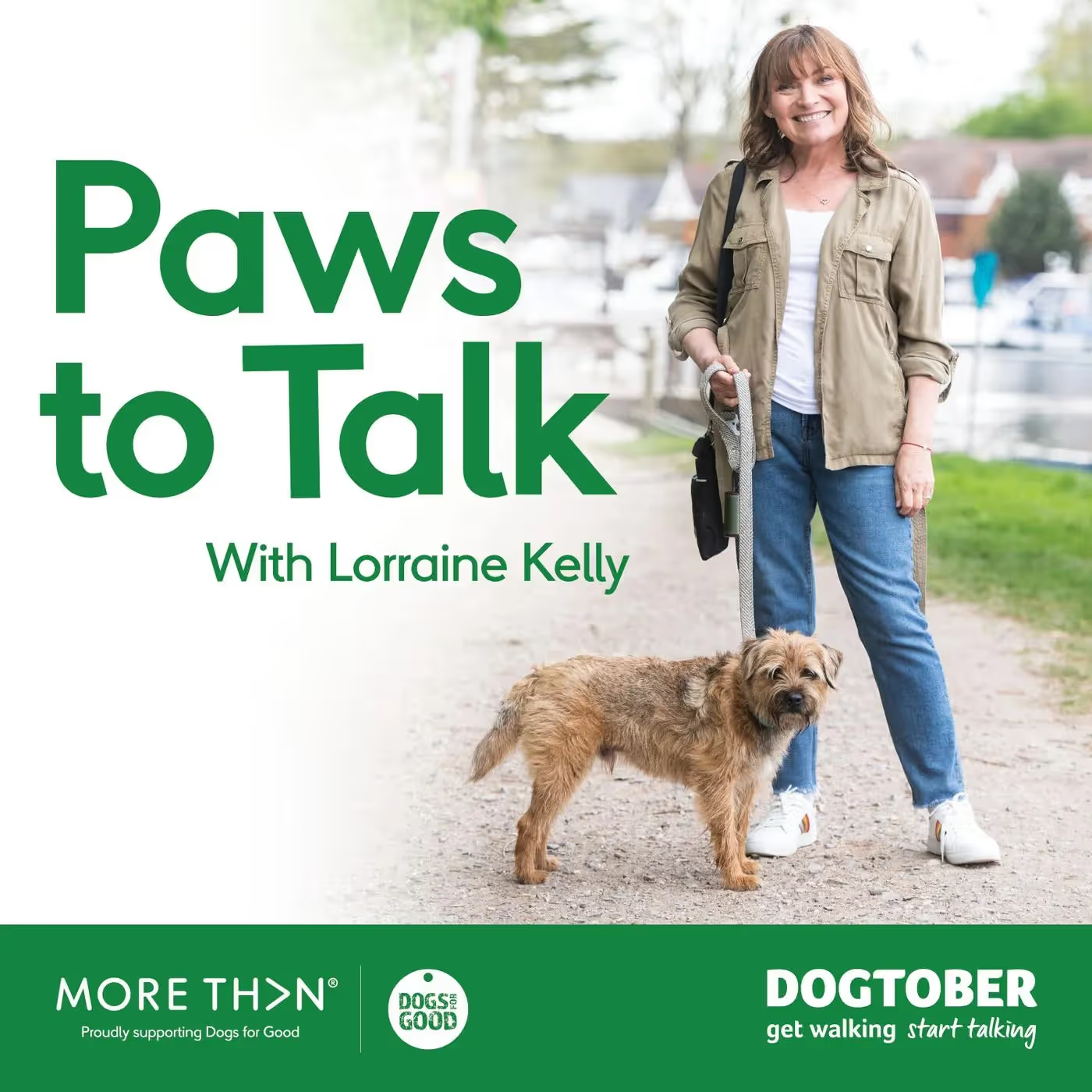
Hosted by Lorraine Kelly (UK journalist and TV presenter), Paws to Talk shares inspiring, first-hand stories from the very people supported by the Dogs for Good charity. Episodes not only celebrate the special relationships dogs help people make, but they also examine the life-long impact of service dogs around the country.
Paws to Talk is a fine example of how branded podcasts can be used to accentuate nonprofit campaigns. The show uses heart-warming first-hand stories and experiences to promote its brand and cause, making listeners more likely to engage or share the show. The host is also a well-known, much-loved figure in the UK, immediately giving the podcast a head-start.

Hosted by Daymond John (founder and CEO of sportswear brand, FUBU), Rise and Grind is an interview podcast exploring the strategies and habits of successful entrepreneurs. Throughout each episode, listeners gain valuable insights on improving their own 'grind' and growing their businesses. The podcast also features occasional interviews with ZipRecruiter executives, sharing additional entrepreneurial wisdom.
Rise and Grind works well as a branded podcast because of its targeted content and audience. The show caters to listeners seeking to build their businesses or brands, making them more receptive to learning from a trusted brand like ZipRecruiter. Moreover, John has an engaging and inquisitive hosting style that adds an extra layer of entertainment and credibility to the show.
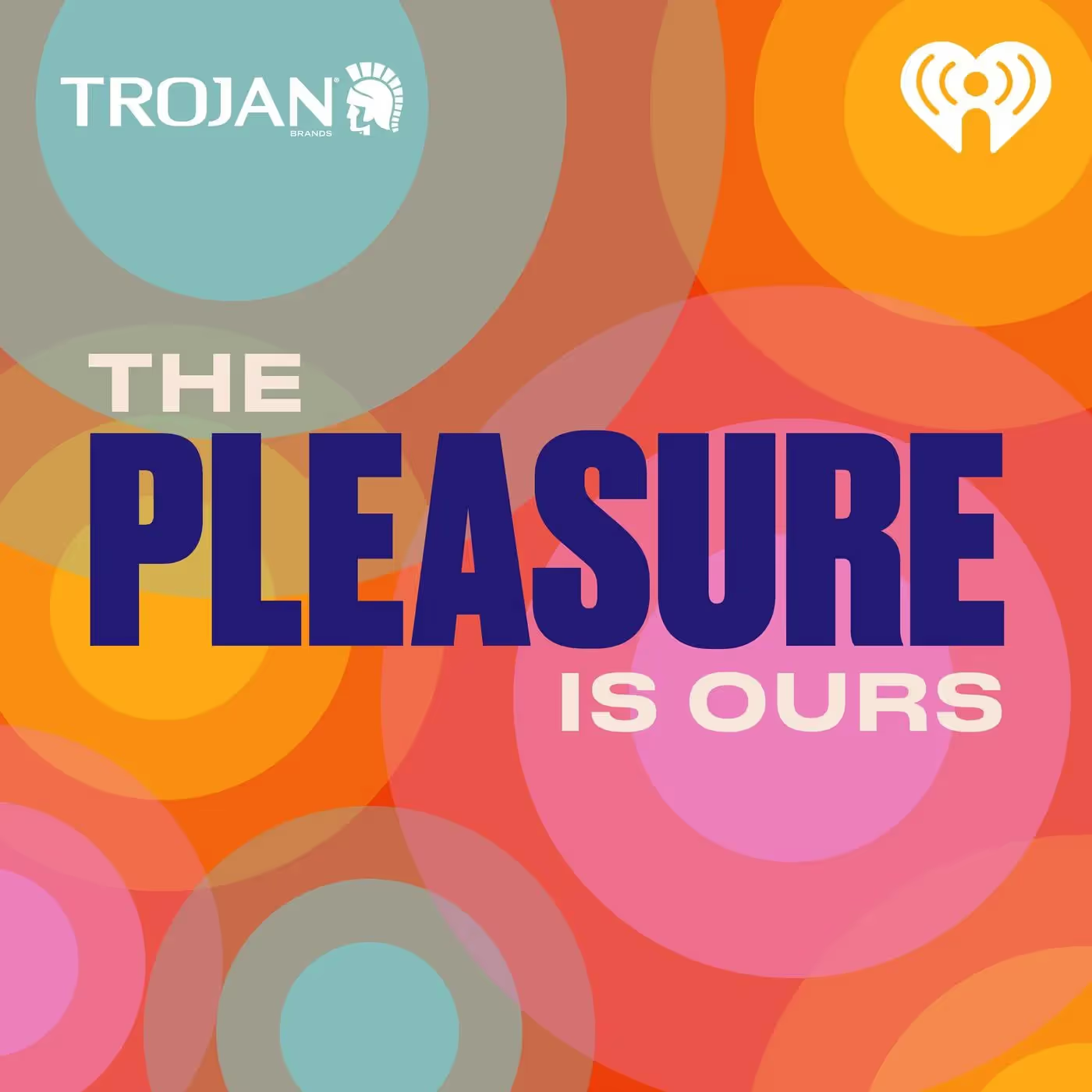
The Pleasure Is Ours, a collaboration between Trojan and iHeartMedia, is a lighthearted podcast that debunks common misconceptions and outdated advice about sex and relationships. Featuring interviews with experts and celebrities, the podcast aims to provide accurate and entertaining information to its listeners, encouraging open discussions around topics often considered taboo.
The Pleasure Is Ours aligns with Trojan's brand identity by promoting sexual health, pleasure, and safety. The podcast's engaging, witty, and informative content resonates with its target audience, showcasing Trojan's commitment to fostering a more open and informed conversation about sex and relationships.
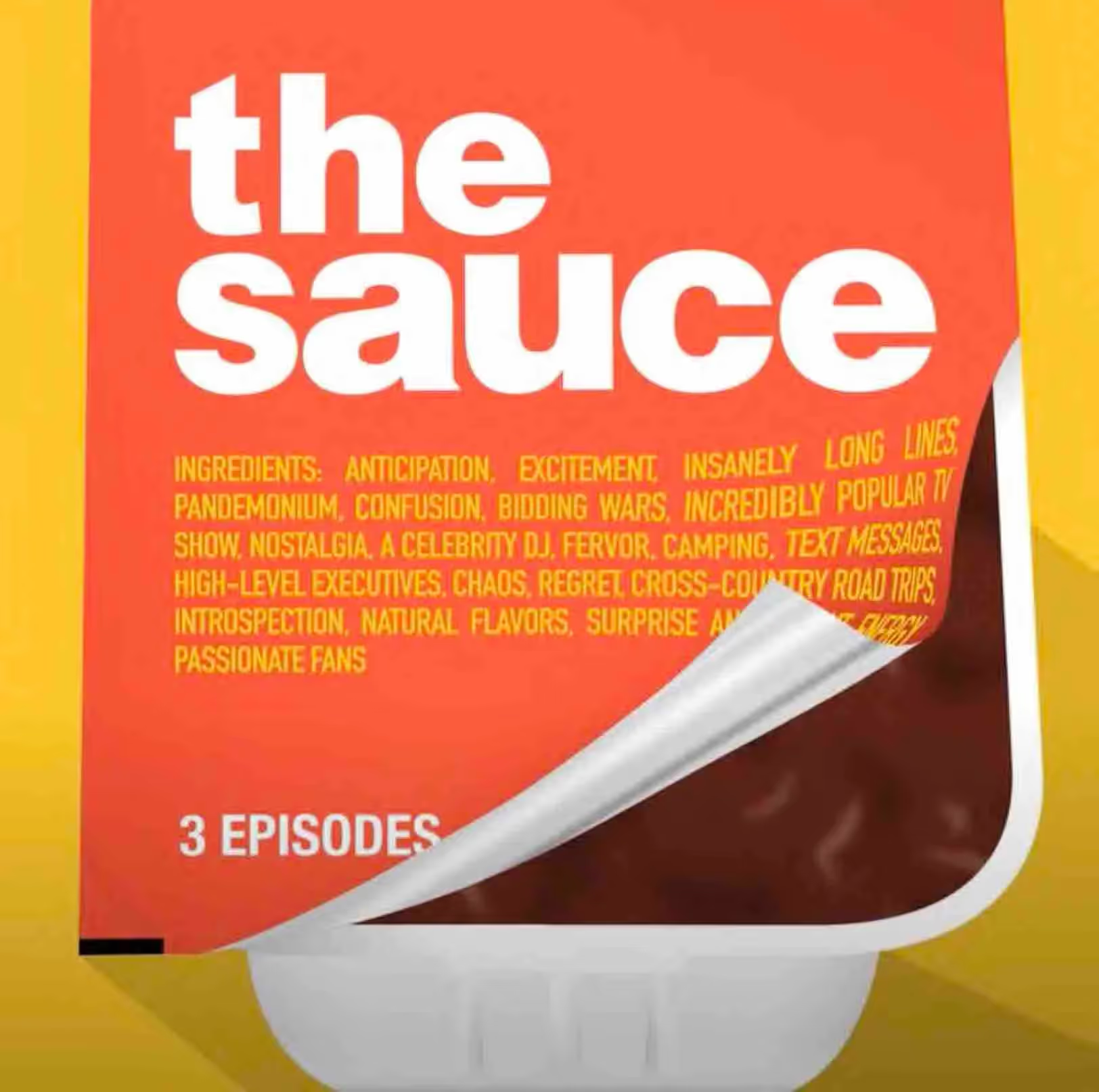
The Sauce was a lighthearted, branded podcast series produced by McDonald’s that delved into the captivating history of the Szechuan Sauce. Initially introduced in 1998 as a limited-time-only promotional dipping sauce, it was largely forgotten until the American animated sitcom Rick and Morty revived its memory.
The TV feature triggered a huge demand from fans to bring back the sauce, leading McDonald’s to reintroduce it. Unfortunately, the promotion turned into a PR disaster when participating outlets across America ran out of the sauce, leaving thousands of customers disappointed.
Instead of letting the mishap tarnish their image, McDonald’s took a playful approach and turned the story into a 3-episode podcast series. The Sauce humorously explains the background of the Szechuan Sauce, the initial goodwill in bringing it back, and the reasons behind the insufficient supply. By embracing a lighthearted and innovative storytelling strategy, McDonald’s showcased its ability to connect with its audience and turn a potentially disastrous situation into an engaging and entertaining branded podcast.

Duolingo Podcasts, produced by the popular language-learning app Duolingo, offer a fascinating and educational experience for listeners looking to improve their language skills. The podcast series is designed to help learners practice their listening comprehension in a captivating and immersive way. Each episode features compelling true stories narrated in easy-to-understand language, with English narration interspersed to provide context and clarity.
Duolingo Podcasts stands out as an excellent branded podcast because of its seamless alignment with the company's core mission: helping people learn and master new languages. By providing engaging, true stories that cater to different skill levels, the podcast effectively complements the app's language-learning experience. This unique approach allows Duolingo to strengthen its connection with its audience while offering valuable educational content supporting its objectives.
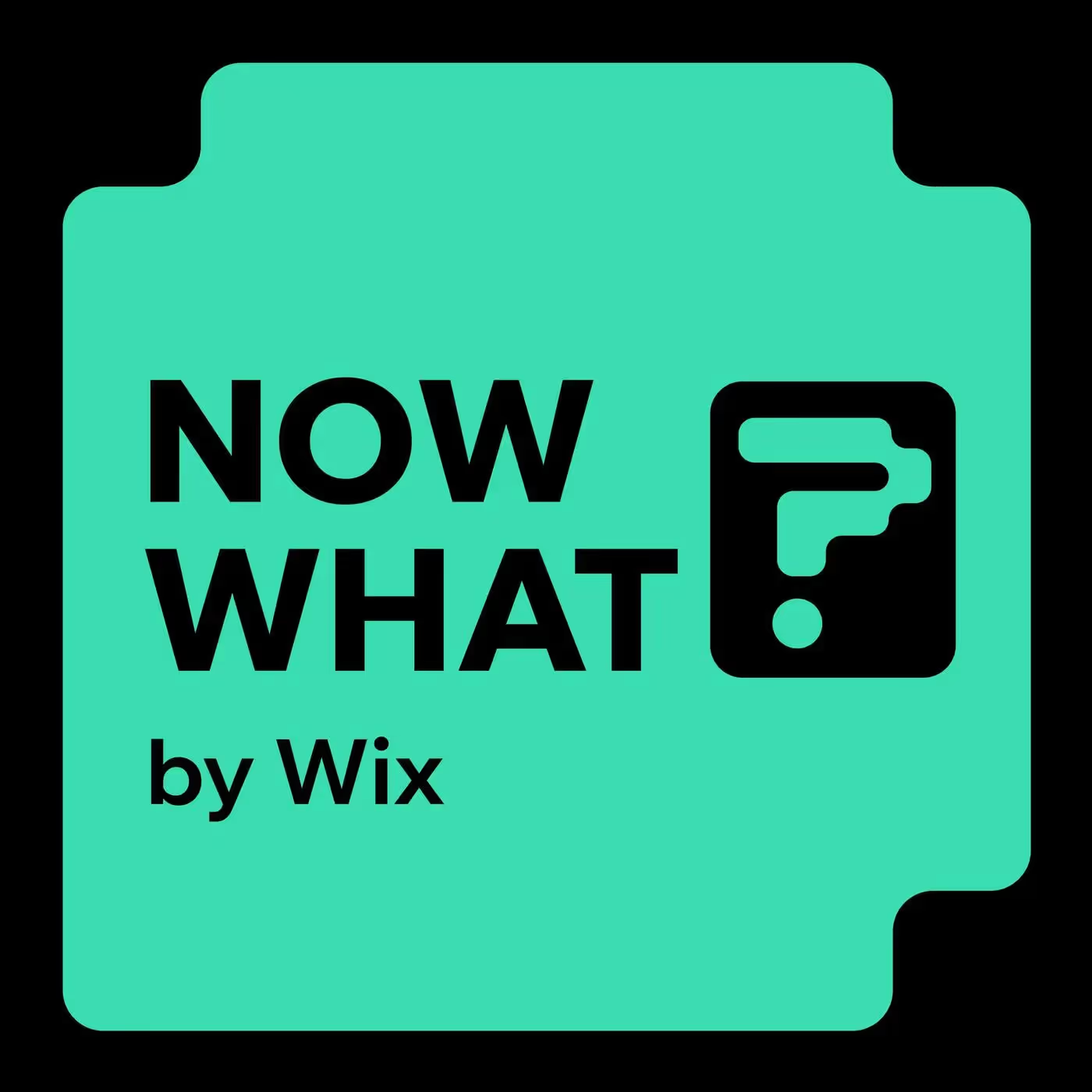
Wix’s Now What? podcast is designed for small businesses, entrepreneurs, and creatives seeking advice on navigating the digital landscape. The show offers valuable insights from industry experts and successful business owners, helping listeners overcome common challenges. Wix's dedication to empowering its users with practical and actionable guidance is evident through this podcast.
The show works well because it focuses on real-life experiences and advice, connecting with its target audience and reinforcing Wix's position as a trusted resource for small business owners and entrepreneurs.
So now you’ve seen some great branded podcasts in action, how do you actually launch one yourself? And, how do you decide which type of content your target audience actually wants to see? Luckily for you, we’ve rounded up 10 actionable tips below to help you get started.
There’s no point creating, recording, and producing a branded podcast if you’re not sure who your target listener is. Who do you want it to reach? And who do you actually want to buy your product or service? Getting clear on these points early on means you can adapt your language, tone, and overall strategy to speak to the right people directly. Failing to do this can result in unclear messaging, and you run the risk of producing a show that doesn’t really resonate with anyone.
Once you’ve defined your target audience, brainstorming what you know about them can be useful when finding the right concept for your branded podcast. What topics do you think they’ll generally want to hear about, and find valuable? If you can find genuine pain points and pitch helpful solutions on your show, you’re golden. Plus, what sort of format are your audience (& potential clients) likely to engage and interact with most? A younger demographic will have very different preferences to an older one. It’s your job as the podcast host to diagnose this.
It goes without saying there are already a lot of podcasts out there. Carrying out some competitor research on other branded podcasts in your space will give you an idea of what listeners want to hear, and what has already been covered. You don’t want to simply replicate another brand’s style or concept. Instead, look at what already exists and think how you can add your own unique spin. What angle or perspective can you offer that others can’t? Once you have an idea of what's currently performing well in your niche, you’ll find it much easier to develop a branded concept that’s relevant, yet different enough to stand out.
As mentioned previously, there are certainly a lot of podcasts on the market. But an awful lot of them are very poorly produced. They give off a distinctly amateur vibe. The good news is this makes it easier for you to stand out. If you invest in the right equipment and spend the time required to produce high-quality, professional-sounding episodes, you’ll instantly be ahead of much of the competition.
Production quality speaks volumes when it comes to branded content. It does require an upfront investment. But it’s definitely worth it if you’re serious about podcasting. If you need some guidance in regards to which equipment to invest in, check out the guides below:
Top 9 Best Podcast Microphones (Budget & Pro)
The Complete Guide to Recording Podcasts Remotely
Creating transparency about the origins of your brand, and the values you stand for can be really beneficial when it comes to building a dedicated audience. If listeners genuinely feel like they know who you are as a brand, they’ll be more willing to stick with you.
Keynote speaker and sales expert John Livesay recently appeared on Park Howell’s (“the world’s most industrious storyteller”) The Business of Story podcast. During the episode, he shared his top 5 storytelling secrets for brands. And one of them was telling your brand’s origin story. He said:
The biggest mistake I see brands making is when they only talk about their product, its features, and how good it is. Great, but what’s your origin story? People want to work with people who are passionate about what they’re doing. Instead of just regurgitating your bio, pull out a story. People want to buy you as much as they do the product, so you need them to like your energy.
Fun, entertaining content will always resonate more with listeners than something that’s stiff and boring. Plus they’ll be more inclined to keep coming back for more. Content that makes people laugh or sparks debate is far more likely to be shared on social media too. So if you're recording episodes solo, try to think of ways you could inject life into topics that otherwise may be perceived as dry or "boring".
If you interview experts on your show, be very selective about who you have on. In today’s market, interview-based shows live or die on the quality of their guests. High-quality production value paired with high-caliber talent is the most reliable way to build an audience. The quality of guests featured in your previous episodes are implicitly reflective of the quality of your brand.
Of course, the bigger the guest is, the harder they are to book. But you should maintain strict standards here. Only interview guests that truly reflect the quality and integrity of your brand. You’ll have to spend more time pitching and you’ll probably receive quite a few rejections. But booking great quests is a numbers game. A 5-10% success rate is to be expected, especially if you’re just starting out with your podcast.
Building a loyal podcast audience doesn’t happen overnight. You need to dedicate a lot of time over months and years to make it a success. And this means you need to be consistent with your publishing schedule. For a newly launched brand with no existing following, to hit 1,000+ downloads per episode you'll likely need to publish every week for at least 12 months. If you’re a brand with a well-established following already, you’ll probably see much quicker growth.
Repurposing episodes into other formats is crucial for driving engagement. Sharing a link to your new episode on social media will only get you so far. It requires a bit more effort to earn new listeners. Plus, it’s always good to flesh out your content strategy and get maximum mileage out of every episode you release. To give you an idea, you might want to convert your episodes into some of the formats below:
Publishing podcast episodes without show notes means you’re missing an opportunity to increase your website traffic and reach new potential listeners. Well-written, compelling show notes create an incentive for your existing listeners to visit your site. And they also help strengthen the overall SEO presence of your podcast. In short, they act as a central information hub for your episodes, providing relevant contextual detail, timestamps, brand information, links to helpful resources, and more. Show notes also give you the opportunity to cross-promote older episodes, make them more shareable, and encourage people to hit ‘subscribe’.
There’s no denying that producing a branded podcast takes a lot of work. And that’s why it’s always smart to invest in your show and do it well. For businesses who are serious about growing their show, this might look like outsourcing certain production tasks to a producer or various freelancers. It can be anything from sound design, to visual assets, to scriptwriting. It’s completely up to you to figure out what you need help with.
If you’re a bigger brand with a production budget to work with, you might decide to partner up with a production agency. An agency will handle everything from the initial concepting stage, right down to promotion and distribution. That’s exactly what we offer at Cue Podcasts. You can check out our showreel below:
Ultimately, the best branded podcasts offer businesses unique opportunities to engage with their target audience, increase brand awareness, boost customer loyalty, and even establish thought leadership in their industry.
With a clear goal, a well-defined strategy, and the right resources, companies can create successful podcasts that resonate with their audiences and help them achieve their marketing objectives. And if you need any help getting started, just fill out this form and someone from the team will get back to you.

Join our carefully curated newsletter packed with insights, tips and resources to help shape and share your stories.